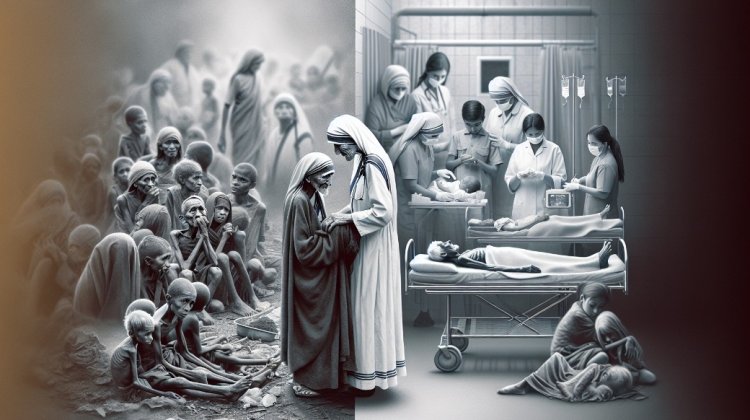Mother Teresa: saint or hypocrite?
"Explore the complex legacy of Mother Teresa in 'Saint or Hypocrite?' This article delves into the contrasting views surrounding her life's work, from her canonization and global reverence to criticisms and controversies, offering a balanced perspective on her humanitarian impact."

Mother Teresa: saint or hypocrite?
Introduction: The Iconic Mother Teresa
Mother Teresa, often referred to as the mother of the poor, has left an indelible mark on the world. Known for her selfless service to the impoverished, she has become a global icon of compassion and love. Mother Teresa's work in the slums of Calcutta, where she cared for the sick and dying, has earned her a reputation as a dedicated servant of the poor.
In recognition of her tireless efforts, Mother Teresa was awarded the Nobel Prize for Peace in 1979. This prestigious accolade further solidified her status as one of the most influential women of the 20th century. Her commitment to alleviating the suffering of others and promoting peace has inspired countless individuals.
However, despite her iconic status, questions have arisen about the justification of Mother Teresa's legacy. Some critics argue that her approach to charity and her treatment of the poor were questionable. They question whether she truly had the best interests of the impoverished at heart or if her actions were driven by religious motivations.
While Mother Teresa's reputation as an iconic figure remains largely intact, it is important to consider the complexities of her legacy. By examining both her commendable work with the poor and the criticisms raised against her, we can gain a more comprehensive understanding of this influential figure.
Questioning Mother Teresa's Treatment of the Poor
While Mother Teresa is revered as a saintly figure for her work with the poor, there are several concerning aspects of her treatment of the impoverished that have been brought to light. These criticisms raise important questions about the true motives behind her actions and the quality of care she provided.
Evidence of Poor Medical Care and Unsanitary Conditions in Mother Teresa's Ashram
-
Dr. Jack Preger, a British doctor who worked with Mother Teresa, discovered that there was a lack of proper medical care in her ashram.
-
Poor patients were housed in overcrowded and unsanitary conditions, with no chairs or proper beds.
-
Patients were often denied basic medical supplies and painkillers, leading to unnecessary suffering.
Lack of Proper Supplies and Neglect of Patients
-
Mother Teresa's ashram had access to ample donations, including medical supplies, but these were not used to improve the conditions for the poor.
-
Needles were reused, posing a risk of infection, and were often not properly sterilised.
-
Patients were neglected, with nuns and staff members ignoring their needs and leaving them to suffer.
Controversial practises like reusing needles and denying painkillers
-
One of the most alarming practices was the reuse of injection needles, which were not properly sterilised.
-
Patients were denied painkillers, even in cases of severe burns or injuries.
-
Mother Teresa believed that suffering was a necessary part of one's spiritual journey, which raises ethical concerns about her approach to care.
These revelations undermine the image of Mother Teresa as a selfless carer and call into question the true intentions behind her actions. It is important to consider these criticisms alongside her commendable work in order to form a comprehensive understanding of her complex legacy.
The Cult of Suffering and Mother Teresa's Beliefs
Mother Teresa's approach to charity and her beliefs surrounding suffering and self-punishment have raised important questions about her true motivations and the contradictions within her actions.
Mother Teresa's Obsession with Suffering and Self-Punishment
Mother Teresa had a deep obsession with suffering and believed that it was necessary for individuals to endure pain in order to come closer to Jesus. She imposed strict discipline on herself and encouraged her nuns to engage in self-flagellation, whipping themselves as a form of penance. This obsession with suffering raises concerns about the psychological state of Mother Teresa and the impact it had on her treatment of the poor.
Comparison of Poor People's Suffering to Jesus on the Cross
Mother Teresa often compared the suffering of the poor to Jesus' suffering on the cross. She believed that by enduring pain and hardship, the poor could become closer to God. While this comparison may have been intended to provide solace to those in poverty, it raises ethical concerns about the way she viewed and treated the impoverished. Instead of addressing the root causes of their suffering and providing them with proper medical care and support, Mother Teresa seemed to glorify their pain.
Contradiction with Jesus' Message of Love and Compassion
Mother Teresa's emphasis on suffering and her neglect of the poor contradict the central message of Jesus, which is one of love, compassion, and helping those in need. Jesus preached the importance of caring for the sick, feeding the hungry, and showing kindness to others. Mother Teresa's focus on suffering and her failure to provide proper medical care to those she served raised questions about her understanding of Jesus' teachings and her true motivations.
These aspects of Mother Teresa's beliefs and actions highlight the complexities of her legacy and the need for a thorough examination of her treatment of the poor. While her commitment to serving the impoverished is commendable, it is important to critically analyse the contradictions and potential harm caused by her obsession with suffering.
Controversies Surrounding Mother Teresa's Finances
While Mother Teresa is widely lauded for her charitable work, there are several controversies surrounding her management of finances and lack of transparency. These controversies raise important questions about the ethical conduct of her organisation, the Missionaries of Charity.
Accusations of financial misconduct and lack of transparency
-
Mother Teresa's organisation, the Missionaries of Charity, has been accused of financial misconduct and a lack of transparency in their financial dealings.
-
Despite receiving significant donations, the organisation did not provide proper medical care or use the funds to improve the conditions of the poor.
-
Mother Teresa's refusal to publish the organisation's accounts raises concerns about the management of the donations and where the money was allocated.
Missionaries of Charity's funds being deposited in the scandalous Vatican Bank
-
Investigations have revealed that the funds of the Missionaries of Charity were deposited in the Vatican Bank, which has a history of scandalous financial activities.
-
The Vatican Bank has been accused of money laundering, ties to the mafia, and other illicit activities.
-
It is unclear why Mother Teresa chose to deposit the funds in this controversial institution instead of using them for the benefit of the poor.
Accepting donations from criminals and refusing to return them
-
Mother Teresa accepted donations from individuals with questionable backgrounds, including Charles Keating, who was involved in a major financial scandal.
-
Despite the accusations against these individuals, Mother Teresa did not return the donations or distance herself from them.
-
This raises concerns about Mother Teresa's ethical standards and whether she prioritised the well-being of the poor over financial contributions.
These controversies surrounding Mother Teresa's finances and the management of funds by the Missionaries of Charity cast a shadow over her legacy. It is important to critically examine the actions and decisions of this influential figure in order to gain a more comprehensive understanding of her true motivations and the impact of her charitable work.
Mother Teresa's Involvement in Scandals and Controversial Figures
Despite her reputation as a saintly figure, Mother Teresa's involvement in various scandals and connections with controversial figures raise important questions about her true motivations and the impact of her actions. These controversies highlight the complexities of her legacy and call into question the ethical conduct of her organisation, the Missionaries of Charity.
Fr. Donald McGuire's Sexual Abuse of Minor Boys and Mother Teresa's Support for Him
-
Fr. Donald McGuire was a popular priest who worked for Mother Teresa and travelled the world for retreats.
-
Mother Teresa trusted McGuire and allowed him to persuade young girls to become nuns and engage in retreats.
-
Unbeknownst to Mother Teresa, McGuire sexually abused minor boys for decades.
-
Despite complaints against McGuire, Mother Teresa wrote a letter supporting him and urging the ministries to reinstate him.
-
Mother Teresa's support for McGuire raises concerns about her commitment to protecting vulnerable individuals and her prioritisation of the reputation of the priesthood over the well-being of victims.
Her Connections with Scammers and Dictators
-
Mother Teresa had connections with individuals involved in criminal activities, such as Charles Keating.
-
Keating, who was involved in a major financial scandal, donated over a million dollars to Mother Teresa's organisation, and she accepted the money.
-
Mother Teresa used Keating's private jets and wrote a letter to a judge asking for leniency for Keating, despite his crimes.
-
Her association with criminals raises concerns about her ethical standards and whether she prioritised financial contributions over the well-being of the poor.
Using her influence to protect individuals involved in criminal activities
-
Mother Teresa's influence and reputation allowed her to protect individuals involved in criminal activities, such as Fr. McGuire and Charles Keating.
-
She used her position to ensure that McGuire was reinstated in the ministry, despite his history of sexual abuse.
-
Mother Teresa's actions raised questions about her judgment and whether she prioritised the reputation of the church over the safety and well-being of vulnerable individuals.
These scandals and associations cast a shadow over Mother Teresa's legacy and highlight the need for a critical examination of her actions and true motivations. It is important to consider these controversies alongside her charitable work in order to form a comprehensive understanding of this influential figure.
Deceptive conversion practices
Mother Teresa's legacy is often praised for her selfless service to the impoverished and her dedication to helping others. However, there are some concerning practices when it comes to her methods of converting people to Christianity.
Questionable methods of converting people to Christianity
-
Mother Teresa would often approach vulnerable individuals, such as those who were sick or dying, to convert them to Christianity.
-
She would use the promise of salvation as a means to persuade individuals to convert.
-
These methods raise ethical concerns about the exploitation of vulnerable individuals for religious purposes.
Using vulnerable and dying individuals for conversions
-
Mother Teresa would target individuals who were in a weakened state, such as those who were sick or dying, in order to convert them to Christianity.
-
She would offer them spiritual solace and the promise of a better afterlife in exchange for their conversion.
-
This raises questions about the true intentions behind her actions and the potential manipulation of vulnerable individuals.
Failure to provide proper care alongside the promise of salvation
-
Alongside her efforts to convert individuals, Mother Teresa failed to provide proper medical care and support to those she served.
-
While she offered the promise of salvation, she did not prioritise the physical well-being and care of those she converted.
-
This raises concerns about the lack of comprehensive care provided by Mother Teresa and the potential harm caused by prioritizing conversions over proper medical treatment.
These deceptive conversion practices undermine the integrity of Mother Teresa's work and call into question the true motivations behind her actions. It is important to critically examine these practices in order to form a more comprehensive understanding of her legacy.
Conclusion: Mother Teresa's Legacy Reconsidered
After examining the evidence against Mother Teresa's reputation, it becomes clear that her legacy is not without controversy. While she is revered as a saintly figure for her work with the poor, there are significant concerns about her treatment of the impoverished and the quality of care she provided.
The evidence shows that Mother Teresa's ashram lacked proper medical care and was plagued by unsanitary conditions. Patients were denied basic medical supplies and painkillers, and needles were reused without proper sterilisation. These revelations undermine the image of Mother Teresa as a selfless carer and raise questions about her true intentions.
Furthermore, Mother Teresa's obsession with suffering and her belief that it was necessary for individuals to endure pain in order to come closer to Jesus raise ethical concerns. Her emphasis on suffering and neglect of the poor contradicts the central message of Jesus, which is one of love, compassion, and helping those in need.
Controversies surrounding Mother Teresa's finances and her connections with scandalous figures also cast a shadow over her legacy. Her organisation, the Missionaries of Charity, has been accused of financial misconduct and a lack of transparency. Donations received by the organization were deposited in the scandalous Vatican Bank, and Mother Teresa accepted donations from individuals with questionable backgrounds without returning the money or distancing herself from them.
Additionally, Mother Teresa's involvement with individuals accused of criminal activities, such as Fr. Donald McGuire, raises concerns about her judgement and whether she prioritised the reputation of the church over the safety and well-being of vulnerable individuals.
Lastly, Mother Teresa's deceptive conversion practices, where she targeted vulnerable and dying individuals to convert them to Christianity, undermine the integrity of her work. These practices raise ethical concerns about the exploitation of vulnerable individuals for religious purposes, especially when proper medical care and support are not provided alongside the promise of salvation.
In conclusion, while Mother Teresa's commitment to serving the poor is commendable, a thorough examination of her legacy necessitates considering the complexities and controversies surrounding her actions. We must weigh the evidence against her reputation, debate whether she deserves the title of saint, and carefully consider the impact of her actions on the poor. By critically analysing Mother Teresa's legacy, we can gain a more comprehensive understanding of this influential figure.



 admin
admin 










